|
Books Should Be Free Loyal Books Free Public Domain Audiobooks & eBook Downloads |
|
|
Books Should Be Free Loyal Books Free Public Domain Audiobooks & eBook Downloads |
|
Dramatic Works |
|---|
Book type:
Sort by:
View by:
|
By: Stanley Houghton (1881-1913) | |
|---|---|
 Hindle Wakes (with accompanying essay)
Hindle Wakes (with accompanying essay)
Alan Jeffcote, son of Nat Hawthorn, Hindle's richest factory owner, meets Fanny Hawthorn, daughter of Nat's 'slasher' and oldest friend, in Blackpool and the two go off for what they believe to be secret fling in Llandudno. But after the death of Fanny's friend, Mary, in a pleasure boat accident at Blackpool the secret is revealed and the the two families are thrown into disarray. The leading light of the so-called Manchester School of realist dramatists, Stanley Houghton wrote Hindle Wakes in 1911 and it was a hit both in Mrs... | |
By: Steele Rudd (1868-1935) | |
|---|---|
 Dave Brings Home A Wife (dramatic reading)
Dave Brings Home A Wife (dramatic reading)
This is a self-contained story-arc over eight chapters from the pages of Steele Rudd's book "Back At Our Selection". The Synopsis: After being a shy bachelor for a number of years, Dave has finally got married. To a "Girl from Town" named "Lily White". When she first arrives at "Ruddville", she and Dave's sister Sarah get on wonderfully. But after some months, friction between the two young woman sets in, and Dave and Lily seek to have a separate house of their own on the extensive Rudd property... | |
By: Susan Coolidge (1835-1905) | |
|---|---|
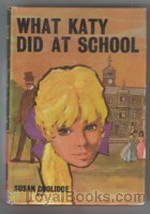 What Katy Did at School
What Katy Did at School
The continuing story of Katy Carr, recounting the time she spent at boarding school with her sister Clover. | |
By: Susan Glaspell (1876-1948) | |
|---|---|
 Trifles
Trifles
On the surface, this short play is a slice-of-life story about a murder investigation in the rural United States. However, it is also a story about the relationships between men and women, husbands and wives, and the often-overlooked "trifles" which can say so much about a person's life. | |
By: Thomas Louis Buvelot Esson (1878-1943) | |
|---|---|
 Time is Not Yet Ripe
Time is Not Yet Ripe
Thomas Louis Buvelot Esson (1878 - 1943) was an Australian poet, journalist and playwright. He was born in Edinburgh but moved to Melbourne, Australia when he was three. He attended the University of Melbourne and began working as a journalist and playwright soon after. His best known work is the political comedy, The Time is Not Yet Ripe, first performed in 1912. It has since come to be acknowledged as an Australian classic, and has often been revived. | |
By: Thomas Love Peacock (1785-1866) | |
|---|---|
 Headlong Hall
Headlong Hall
Headlong Hall is the first novel by Thomas Love Peacock, published in 1815 (dated 1816). As in his later novel Crotchet Castle, Peacock assembles a group of eccentrics, each with a single monomaniacal obsession, and derives humor and social satire from their various interactions and conversations. The setting is the country estate of Squire Harry Headlong Ap-Rhaiader, Esq. in Wales. | |
By: Thomas Middleton (1580-1627) | |
|---|---|
 Women Beware Women
Women Beware Women
Thomas Middleton's masterful 17th century tragedy is packed with adultery, incest, intrigue, revenge, and inventive methods for murder. Leantio elopes with Bianca against her family's wishes and tries to hide her in the house he shares with his widowed mother. Yet the Duke sees Bianca at the window and is powerfully attracted to her, threatening Leantio's security. Livia, a wealthy widow, delights in intrigue, aiding the Duke to satisfy his desires with Bianca, and bringing together her brother Hippolito with her niece Isabella, despite their familial relationship... | |
By: Thomas Middleton and Thomas Dekker | |
|---|---|
 The Roaring Girl
The Roaring Girl
The Roaring Girl is a rip-roaring Jacobean comedy co-written by Thomas Middleton and Thomas Dekker and first published in 1611. The play is a fictionalized dramatization of the life of Mary Frith, known as "Moll Cutpurse", a woman who had gained a reputation as a virago in the early 17th century. (The term "roaring girl" was adapted from the slang term "roaring boy", which was applied to a young man who caroused publicly, brawled, and committed petty crimes.) The play combines the exploits of the cross-dressed Moll with the amorous adventures of a trio of merchants' wives, and the forbidden romance between Sebastian Wengrave and Mary Fitzallard. | |
By: Thornton W. Burgess (1874-1965) | |
|---|---|
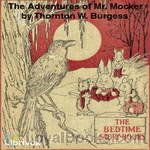 The Adventures of Mr. Mocker
The Adventures of Mr. Mocker
When an innocent blue jay starts talking in his sleep, it’s up to him to find out what’s going on in this fun, naturalistic, Southern-style children’s story. | |
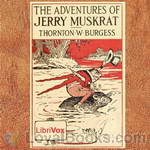 The Adventures of Jerry Muskrat
The Adventures of Jerry Muskrat
Join us as we follow Jerry Muskrat and his friends on an adventure to discover what is threatening their homeland; The Laughing Brook and The Smiling Pool. | |
 Adventures of Danny Meadow Mouse (dramatic reading)
Adventures of Danny Meadow Mouse (dramatic reading)
Danny begins his tale regretting the length of his tail until he is corrected by Mr. Toad. Then he has a series of stalkings by Reddy and Granny Fox. He is captured by Hooty the Owl and escapes mid-flight to Peter Rabbit's briar patch. Peter goes to Farmer Brown's peach orchard and gets caught in a snare and barely escapes himself. Finally Danny gets trapped in a tin can and must use his wits to escape Reddy Fox again. | |
 Adventures of Chatterer the Red Squirrel (Dramatic Reading)
Adventures of Chatterer the Red Squirrel (Dramatic Reading)
Author and editor of numerous children's books, Thornton W. Burgess was also a noted conservationist. In writing for youngsters he combined a gift for storytelling with his love of the outdoors, creating an entertaining menagerie of animals whose adventures he skillfully recounted in a series of charming fables. In them, he taught young readers about nature and encouraged them to love the "lesser folk in fur and feathers." In this delightfully told tale, Burgess chronicles the escapades of Chatterer the Red Squirrel, who's known throughout the Green Forest as a mischief maker... | |
By: Unknown | |
|---|---|
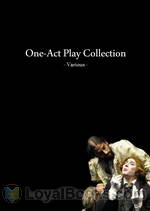 One-Act Play Collection
One-Act Play Collection
One-Act Play Collection includes 6 one-act plays in the public domain. | |
 Everyman
Everyman
The Somonyng of Everyman (The Summoning of Everyman), usually referred to simply as Everyman, is a late 15th-century English morality play. Like John Bunyan's novel Pilgrim's Progress, Everyman examines the question of Christian salvation by use of allegorical characters, and what Man must do to attain it. The premise is that the good and evil deeds of one's life will be tallied by God after death, as in a ledger book. The play is the allegorical accounting of the life of Everyman, who represents all mankind... | |
 The Drama: A Quarterly Review
The Drama: A Quarterly Review
This is a collection of theatrical essays from the American quarterly The Drama, including six non-fiction works -- 3 profiles: Schnitzler, Andreyev, and O'Neill, and 3 articles: Characterization vs Situation, The Actor in England, & The Evolution of The Actor. | |
 String of Pearls (dramatic reading)
String of Pearls (dramatic reading)
Todd is a barber who murders his customers and turns their remains into meat pies, sold at the pie shop of his partner in crime: Mrs. Lovett; Todd's barber shop is situated in Fleet Street, London, next to St. Dunstan's church, and is connected to Lovett's bakers shop in nearby Bell Yard by means of an underground passage. Todd dispatches his victims by pulling a lever while they are in his barber chair, which makes them fall backward down a revolving trapdoor, generally causing them to break their necks or skulls... | |
By: Upton Sinclair (1878-1968) | |
|---|---|
 The Machine
The Machine
Upton Sinclair is best known for his novel The Jungle, an expose of the meatpacking industry. He was also a playwright whose works for the stage reflected the same progressive viewpoints found in his other writing. In The Machine, published as part of Sinclair's 1912 collection Plays of Protest, Socialist activists show a rich man's daughter the truth about the society in which she has been raised. | |
By: Various | |
|---|---|
 One-Act Play Collection 003
One-Act Play Collection 003
This collection of ten one-act dramas features plays by Edward Goodman, Alice Gerstenberg, Arnold Bennett, John Galsworthy, Anton Chekhov, Frank Wedekind, Moliere, Theresa Helburn, John Kendrick Bangs, and Harold Brighouse. | |
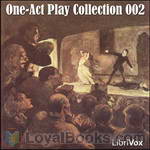 One-Act Play Collection 002
One-Act Play Collection 002
This collection of eight one-act dramas features plays by Eugene O'Neill, George Bernard Shaw, John Galsworthy, Susan Glaspell, William Dean Howells and John Millington Synge. It also includes a dramatic reading of a short story by Frank Richard Stockton. | |
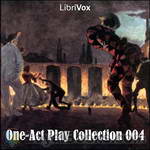 One Act Play Collection 004
One Act Play Collection 004
This collection of twelve one-act dramas features plays by James Allen, John Kendrick Bangs, Gordon Bottomley, Charles Dickens, Lord Dunsany, Susan Glaspell, George Bernard Shaw, August Strindberg, Marion Craig Wentworth, and William Butler Yeats. The plays were coordinated by Elizabeth Barr, Margaret Espaillat, Amanda Friday, Elizabeth Klett, Kristingj, David Lawrence, Algy Pug, Todd, and Chuck Williamson. | |
 Dramatic Reading Scene and Story Collection, Volume 003
Dramatic Reading Scene and Story Collection, Volume 003
readers present a collection of their favorite chapters and short stories, with the original author’s words all brought to life with different reader voices for each character in our popular Dramatic Reading style. This volume includes readings from Louisa May Alcott, two by L M Montgomery, Lewis Carroll, Victor Hugo, Kate Chopin, C K Chesterton, Jack London, and A A Milne. NOTE that Milne died in 1956 and this story is not PD in for listeners in Europe and/or Australia, and other countries which observe copyright of author's death +70 years... | |
By: Victor Hugo (1802-1885) | |
|---|---|
 Mary Tudor
Mary Tudor
If Queen Mary I of England wants something, you'd better not try and stop her, or else you might soon find yourself without a head! When this hot-headed young Royal's new favourite courtier, an Italian gentleman named Fabiano Fabiani who has already made himself very unpopular with the court, is caught sneaking around with another girl - a commoner no less! - the Queen begins to plan her revenge in the only way suitable for a Queen. Narrator: balaMary I of England: Kristin GjerløwJane Talbot:... | |
By: W. S. Gilbert (1836-1911) | |
|---|---|
 Broken Hearts
Broken Hearts
Gilbert of Gilbert and Sullivan fame also wrote non-musical plays without Sullivan as a partner. Here is a dramatic play far afield from the comedy musicals we often think of when we hear Gilbert's name: Prince Florian of Spain arrives on The Island of Broken Hearts, peopled by "we maidens all [who] have dearly loved, and those we loved have died. We, broken hearts, knit by the sympathy of kindred woe, have sought this isle far from the ken of man; and having loved, and having lost our loves, stand pledged to love no living thing again... | |
 Dan'l Druce, Blacksmith
Dan'l Druce, Blacksmith
A drama from the Gilbert of Gilbert and Sullivan. Pursued by the Parliamentary Army after the Battle of Worcester, some Royalist soldiers take cover in Dan'l Druce's hut on the Norfolk Coast until they can escape. An event with long shadows that come back to disturb his life fourteen years later. - Summary by ToddHW Cast list: Sir Jasper Combe, a Royalist Colonel: Andrew James Dan'l Druce: Adrian Stephens Reuben Haines, a Royalist Sergeant: Alan Mapstone Geoffrey Wynyard, a Merchant Sailor: Tomas... | |
By: Walter Savage Landor (1775-1864) | |
|---|---|
 Imaginary Conversations (Dramatic Reading)
Imaginary Conversations (Dramatic Reading)
This is a group of Imaginary Conversations by Walter Savage Landor. It is a series of dialogues of historical and mythical characters. Marcellus and Hannibal, Queen Elizabeth and Cecil, Peter the Great and Alexis, Louis XIV and Father La Chaise, Henry VIII and Anne Boleyn are just a few of the delights on offer. Plenty to choose from and some great reads. - Summary by Michele Eaton Cast List: Landor: pjmorgan Marcellus: SirQueezle Hannibal: bala The Surgeon: CharlieOldfield Gaulish... | |
By: William Congreve (1670 -1729) | |
|---|---|
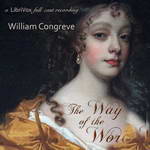 The Way of the World
The Way of the World
The Way of the World is a play written by British playwright William Congreve. It premiered in 1700 in the theatre in Lincoln's Inn Fields in London. It is widely regarded as being one of the best Restoration comedies written and is still performed sporadically to this day.The play is based around the two lovers Mirabell and Millamant (originally famously played by John Verbruggen and Anne Bracegirdle). In order for the two to get married and receive Millamant's full dowry, Mirabell must receive the blessing of Millamant's aunt, Lady Wishfort... | |
By: William Dean Howells (1837-1920) | |
|---|---|
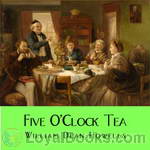 Five O'Clock Tea
Five O'Clock Tea
A light-hearted romantic comedy in twelve short scenes, set during a tea party in the home of Mrs. Amy Somers, a widow who is courted by the ingenuous and delightful Mr. Willis Campbell. | |
By: William Hill Brown (1765-1793) | |
|---|---|
 Power of Sympathy; or, the Triumph of Nature Founded in Truth
Power of Sympathy; or, the Triumph of Nature Founded in Truth
The Power of Sympathy was the first American novel, published in Boston in January 1789. An epistolary novel, it tells the tragic story of the relationship of an orphan girl and a man of good family, with a dramatic twist and tragic ending. It was inspired by an actual scandal in the Apthorp family of Boston, the "Ophelia" and "Martin" related within the story. It was published anonymously, and there has been controversy over the authorship. For over a century his family kept the author's identity secret... | |
By: William Rowley (1585-1626) | |
|---|---|
 Birth of Merlin: The Childe Hath Found His Father
Birth of Merlin: The Childe Hath Found His Father
Merlin. King Arthur. War betwixt British and Saxons. Uther Pendragon. Collapsing castle foundations, Magicians and spirits, and fighting dragons and a blazing comet. Good entertaining stuff. But is it Shakespeare? The 1662 first printed edition of this play says it was written by William Shakespeare and William Rowley. It doesn't appear that anyone any longer believes that Shakespeare was actually involved, and probably this is entirely Rowley - who co-authored plays with a fair number of other authors of the period... | |
By: William S. Gilbert (1836-1911) | |
|---|---|
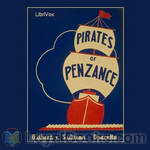 The Pirates of Penzance
The Pirates of Penzance
The Pirates of Penzance; or, The Slave of Duty is a comic opera in two acts, with music by Arthur Sullivan and libretto by W. S. Gilbert. The story concerns Frederic, who, having completed his 21st year, is released from his apprenticeship to a band of tender-hearted pirates. He meets Mabel, the daughter of Major-General Stanley, and the two young people fall instantly in love. Frederic finds out, however, that he was born on 29 February, and so, technically, he only has a birthday each leap year... | |
By: William Shakespeare (1564-1616) | |
|---|---|
 Romeo and Juliet
Romeo and Juliet
William Shakespeare’s most well-known play is more than most people realize. While it is the story of star-crossed lovers, Romeo and Juliet, it is also the story of two families in the middle of a bitter feud. Many people avoid the story because they believe it will be too difficult to read, but this is not true at all. Within a few paragraphs, the play captures your imagination and attention. Juliet is 13 years old and is love with the son of her father’s enemy. Her father has promised that she will marry another boy when it is time, but she refuses to accept the suit... | |
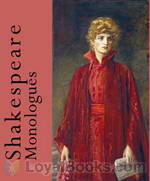 Shakespeare Monologues
Shakespeare Monologues
This is truly a delightful compilation of some of the best known and loved passages from William Shakespeare's plays. Most readers would be familiar with all or at least some of them. If you've studied Shakespeare in school or college, plays like The Merchant of Venice and Macbeth were probably assigned texts. However, if you haven't encountered these plays before, Shakespeare Monologues is a great volume to browse through and enjoy at leisure. It's important to know that there is a distinction between the terms “monologue” and “soliloquy... | |
 King Lear
King Lear
Considered to be one of Shakespeare's greatest plays, the tragedy King Lear portrays some of the darkest aspects of human nature that can be found in literature. The helplessness of the human condition, as we fall prey to our destinies, the injustice and random cruelties practiced by people, suffering and humiliation, the lust for power and the greed for wealth are all depicted in this magnificent play. And through it all, runs the golden thread of love and sacrifice, daughterly affection and the true nature of our relationship with our parents... | |
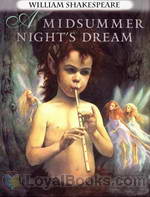 A Midsummer Night's Dream
A Midsummer Night's Dream
Summer nights, romance, music, comedy, pairs of lovers who have yet to confess their feelings to each other, comedy and more than a touch of magic are all woven into one of Shakespeare's most delightful and ethereal creations – A Midsummer Night's Dream. The plot is as light and enchanting as the settings themselves. The Duke of Athens is busy with preparations for his forthcoming wedding to Hippolyta the Amazonian Queen. In the midst of this, Egeus, an Athenian aristocrat marches in, flanked by his lovely daughter Hermia and her two suitors, Lysander and Demetrius... | |
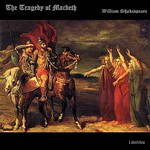 The Tragedy of Macbeth
The Tragedy of Macbeth
Right from its famous opening scene which begins, “Thunder and lightning. Enter Three Witches” The Tragedy of Macbeth by William Shakespeare holds the reader fast in a stirring, monumental experience that plumbs the depths of the human soul and reveals its most morbid secrets. The play is set in medieval Scotland. It is based partly on historical facts and recounts the tale of Macbeth, who was a king in Scotland, according to The Holinshead Chronicles, a book published in 1577. This book was extensively used by contemporary playwrights like Shakespeare and Marlowe as inspiration for their themes, characters and events... | |
 As You Like It
As You Like It
In a tiny French dukedom, a younger brother usurps his elder brother's throne. Duke Senior is banished to the Forest of Arden along with his faithful retainers, leaving his lovely daughter Rosalind behind to serve as a companion for the usurper's daughter, Celia. However, the outspoken Rosalind soon earns her uncle's wrath and is also condemned to exile. The two cousins decide to flee together and join Duke Senior in the forest. Meanwhile, a young nobleman, Orlando is thrown out of his home by his cruel older brother Oliver... | |
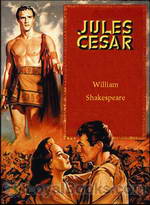 Julius Caesar
Julius Caesar
Though it's titled The Tragedy of Julius Caesar, the man himself appears only in five scenes in the entire play! However, such is his impact on the events that surrounded him that he still remains the central figure in this psychological drama that combines politics, honor, assassination, betrayal, the lust for power, patriotism and friendship. Set in 44 BC in ancient Rome, it is one of William Shakespeare's early Tragedies. First thought to have been performed in September 1599, William Shakespeare's original text or script have long vanished... | |
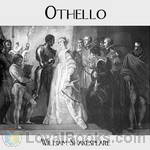 Othello
Othello
In seventeenth century Venice, a wealthy and debauched man discovers that the woman he is infatuated with is secretly married to a Moorish general in the Venetian army. He shares his grief and rage with a lowly ensign in the army who also has reason to hate the general for promoting a younger man above him. The villainous ensign now plots to destroy the noble general in a diabolical scheme of jealousy, paranoia and murder, set against the backdrop of the bloody Turkish-Venetian wars. This timeless tale, Othello The Moor of Venice was one of the ten famous tragedies that William Shakespeare wrote... | |
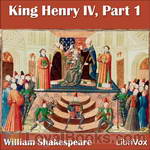 King Henry IV
King Henry IV
King Henry IV, Part 1 is the second of Shakespeare’s eight Wars of the Roses history plays, with events following those of King Richard II. As the play opens, King Henry IV (formerly Henry Bolingbroke) and Henry Percy (Hotspur) argue over the disposition of prisoners from the Battle of Holmedon. The King’s attitude toward Mortimer and the Percy family prompts them to plot rebellion. In the meantime, his son Prince Hal is living the low life in the company of Sir John Falstaff. As the time of battle nears, Prince Hal joins his father and is given a high command... | |
 The Merchant of Venice
The Merchant of Venice
William Shakespeare's The Merchant of Venice was probably written between 1596 and 1598, and was printed with the comedies in the First Folio of 1623. Bassanio, an impoverished gentleman, uses the credit of his friend, the merchant Antonio, to borrow money from a wealthy Jew, Shylock. Antonio pledges to pay Shylock a pound of flesh if he defaults on the loan, which Bassanio will use to woo a rich heiress, Portia. A subplot concerns the elopement of Shylock's daughter Jessica with a Christian, Bassanio's friend Lorenzo... | |
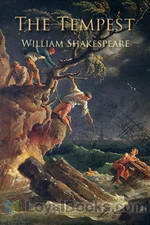 The Tempest
The Tempest
Banished from his own lands by a usurping brother, Prospero and his daughter Miranda have been living on a deserted island for years, until fate brings the brother within the range of Prospero's powers. Will he seek revenge, or reconcilement? | |
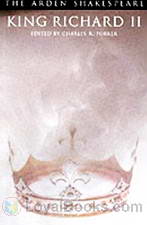 King Richard II
King Richard II
The Tragedy of King Richard II, by William Shakespeare, is the first of the history series that continues with Parts 1 and 2 of King Henry IV and with The Life of King Henry V. At the beginning of the play, Richard II banishes his cousin Henry Bolingbroke from England. Bolingbroke later returns with an army and the support of some of the nobility, and he deposes Richard. Richard is separated from his beloved Queen, imprisoned, and later murdered. By the end of the play, Bolingbroke has been crowned King Henry IV... | |
 Much Ado About Nothing
Much Ado About Nothing
Written around the middle of his career, Much Ado About Nothing is one of Shakespeare's great festive comedies. The men are back from the war, and everyone is ready for romance. The dashing young Claudio falls for Hero, the daughter of Leonato, governor of Messina, and his friend Don Pedro helps him secure her affection. These youthful lovers are contrasted with the more experienced (and more cynical) Benedick and Beatrice, who have to be tricked into falling in love. Don Pedro's bastard brother, Don John, provides the intrigue, and the dimwitted constable Dogberry provides the laughs. | |
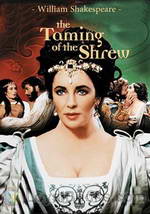 The Taming of the Shrew
The Taming of the Shrew
The Taming of the Shrew is one of Shakespeare's earliest comedies, and was inspired by classical Roman comedy and the Italian commedia dell'arte. Baptista Minola, a rich gentleman of Padua, has two daughters: Katherina, renowned for her sharp tongue, and Bianca, who is sought after by multiple suitors. Baptista decides that Bianca cannot marry until her elder sister finds a husband. Enter Petruchio, who has come to "wive it wealthily in Padua," and who is convinced by Bianca's suitors to woo Katherina. The play ultimately poses the question of who is the bigger shrew: Kate or Petruchio. The subplot involves the subterfuge employed by Lucentio to woo the lovely Bianca. | |
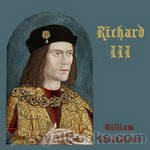 Richard III
Richard III
Richard III is an early history play probably written and performed around 1592-93. It is the culmination of Shakespeare's earlier three plays about Henry VI, and chronicles the bloody career of Richard, Duke of Gloucester. As the play opens, the Wars of the Roses are over, King Edward IV (Richard's brother) is on the throne, and all is ostensibly well. The problem? Richard wants to be king - and he'll stop at nothing to realize his ambition. | |
 All's Well That Ends Well
All's Well That Ends Well
Despite its optimistic title, Shakespeare's All's Well That Ends Well has often been considered a "problem play." Ostensibly a comedy, the play also has fairy tale elements, as it focuses on Helena, a virtuous orphan, who loves Bertram, the haughty son of her protectress, the Countess of Rousillon. When Bertram, desperate for adventure, leaves Rousillon to serve in the King's army, Helena pursues him. | |
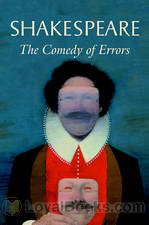 The Comedy of Errors
The Comedy of Errors
The Comedy of Errors is one of William Shakespeare's earliest plays, believed to have been written between 1592 and 1594. It is his shortest and one of his most farcical comedies, with a major part of the humour coming from slapstick and mistaken identity, in addition to puns and word play. The Comedy of Errors tells the story of two sets of identical twins that were accidentally separated at birth. Antipholus of Syracuse and his servant, Dromio of Syracuse, arrive in Ephesus, which turns out to be the home of their twin brothers, Antipholus of Ephesus and his servant, Dromio of Ephesus... | |
 Henry V
Henry V
After the turmoil and uncertainty of Henry IV a new era appears to dawn for England with the accession of the eponymous Henry V. In this sunny pageant, the Chorus guides us along Henry's glittering carpet ride of success as the new king completes his transformation from rebellious wastrel to a truly regal potentate. Of course, there is an underlying feeling that the good times won't last, and this is all the more reason to enjoy the Indian summer before the protracted and bitter fall of the house of Lancaster. | |
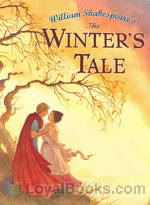 The Winter's Tale
The Winter's Tale
Mad with jealousy, King Leontes of Sicilia orders his best friend Polixenes killed, his child abandoned, and his wife put on trial for adultery. Sixteen years later, Perdita, raised as a shepherd's daughter, falls in love with Polixenes's royal son and returns to her father's kingdom. | |
 Measure For Measure
Measure For Measure
Generally considered one of Shakespeare's problem plays, Measure for Measure examines the ideas of sin and justice. Duke Vincentio turns Vienna's rule over to the corrupt Angelo, who sentences Claudio to death for having impregnated a woman before marriage. His sister Isabella, a novice nun, pleads for her brother's life, only to be told that he will be spared if she agrees to relinquish her virginity to Angelo. | |
 Love's Labour's Lost
Love's Labour's Lost
Love's Labour's Lost is an early comedy by William Shakespeare. Ferdinand, the King of Navarre, and his three friends take a vow of study and seclusion for three years, during which they are forbidden to see or speak to women. Their vows are immediately tested by the arrival of the Pricess of France and her three ladies to the King's court. | |
 Titus Andronicus
Titus Andronicus
Titus Andronicus may be Shakespeare's earliest tragedy; it is believed to have been written in the early 1590s. It depicts a Roman general who is engaged in a cycle of revenge with his enemy Tamora, the Queen of the Goths. The play is by far Shakespeare's bloodiest work. It lost popularity during the Victorian era because of its gore, and it has only recently seen its fortunes revive. | |
 Antony and Cleopatra
Antony and Cleopatra
Antony and Cleopatra is a tragedy by William Shakespeare, believed to have been written sometime between 1603 and 1607. It was first printed in the First Folio of 1623. The plot is based on Thomas North's translation of Plutarch's Life of Marcus Antonius and follows the relationship between Cleopatra and Mark Antony from the time of the Parthian War to Cleopatra's suicide. The major antagonist is Octavius Caesar, one of Antony's fellow triumviri and the future first emperor of Rome. The tragedy is a Roman play characterized by swift, panoramic shifts in geographical locations and in registers, alternating between sensual, imaginative Alexandria and the more pragmatic, austere Rome. | |
 Henry VI
Henry VI
Henry VI, Part 1 is a history play by William Shakespeare, believed to have been written in 1591, and set during the lifetime of King Henry VI of England. Whereas 2 Henry VI deals with the King's inability to quell the bickering of his nobles, and the inevitability of armed conflict, and 3 Henry VI deals with the horrors of that conflict, 1 Henry VI deals with the loss of England's French territories and the political machinations leading up to the Wars of the Roses, as the English political system is torn apart by personal squabbles and petty jealousy. | |
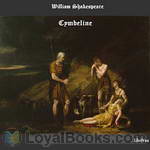 Cymbeline
Cymbeline
Cymbeline is one of Shakespeare's late romances, which (like The Tempest and The Winter's Tale) combines comedy and tragedy. Imogen, the daughter of King Cymbeline of Britain, angers her father when she marries Posthumus, a worthy but penniless gentleman. The King banishes Posthumus, who goes to Rome, where he falls prey to the machinations of Iachimo, who tries to convince him that Imogen will be unfaithful. Meanwhile, the Queen (Imogen's stepmother) plots against her stepdaughter by trying to plan a match between Imogen and her worthless son Cloten. | |
 The Two Gentlemen of Verona
The Two Gentlemen of Verona
The Two Gentlemen of Verona is the earliest comedy written by Shakespeare (and possibly his first play), probably written around 1590-91. It focuses on two friends, Valentine and Proteus, whose friendship is disrupted by their mutual passion for the lovely Silvia. Proteus jilts Julia in order to pursue Silvia; she responds by enlisting the help of her maid Lucetta to dress as a boy and go after Proteus. The play also includes some wonderfully comic supporting characters, particularly Launce and his scene-stealing dog Crab. | |
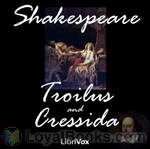 Troilus and Cressida
Troilus and Cressida
Troilus and Cressida is Shakespeare's "problem" play about the Trojan War. As the opening Chorus tells us, the play "begins in the middle" of the epic conflict, and counterpoints the drama of battle with the romance of the title characters. Just as Agamemnon and his Greek forces (particularly the smooth-tongued Ulysses) attempt to woo the invincible Achilles to resume fighting on their side, the Trojan go-between Pandarus tries to bring together Troilus, a son of King Priam, with his niece, the lovely Cressida. | |
 Henry VIII
Henry VIII
This is Shakespeare's dutiful tribute to one of the most imposing and terrifying rulers in European history. The kingdom trembles as the giant monarch storms through his midlife crisis, disposing of the faithful Katharine of Aragon and starting a new life and, the king hopes, a line of succession with the captivating young Anne Bullen. Unlike his predecessors, Henry has no doubt about the security of his tenure on the throne, and dominates the royal court with absolute authority. The extent of the King's power is graphically illustrated by the fate of the Duke of Buckingham, who goes calmly to execution while deploring, not the unjust despotism of the king... | |
 Coriolanus
Coriolanus
Shakespeare was passionately interested in the history of Rome, as is evident from plays like Titus Andronicus, Julius Caesar, and Antony and Cleopatra. His tragedy Coriolanus was probably written around 1605-07, and dramatizes the rise and fall of a great Roman general, Caius Martius (later surnamed Coriolanus because of his military victory at Corioli). This play is unusual in that it provides a strong voice for the ordinary citizens of Rome, who begin the play rioting about the high price of food, and who continually clash with Coriolanus because of his contempt for plebians. | |
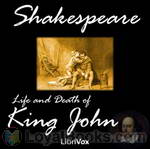 King John
King John
The Life and Death of King John, a history play by William Shakespeare, dramatises the reign of John, King of England (ruled 1199–1216), son of Henry II of England and Eleanor of Aquitaine and father of Henry III of England. It is believed to have been written in the mid-1590s but was not published until it appeared in the First Folio in 1623. John (24 December 1166 – 19 October 1216), also known as John Lackland or Softsword, was King of England from 6 April 1199 until his death. His reign... | |
 The Merry Wives of Windsor
The Merry Wives of Windsor
The Merry Wives of Windsor is a comedy by William Shakespeare, first published in 1602, though believed to have been written prior to 1597. It features the fat knight Sir John Falstaff, and is Shakespeare's only play to deal exclusively with contemporary Elizabethan era English middle class life. | |
 Pericles, Prince of Tyre
Pericles, Prince of Tyre
Pericles, Prince of Tyre is a Jacobean play written at least in part by William Shakespeare and included in modern editions of his collected works despite questions over its authorship, as it was not included in the First Folio. Modern editors generally agree that Shakespeare is responsible for almost exactly half the play—827 lines—the main portion after scene 9 that follows the story of Pericles and Marina. Modern textual studies indicate that the first two acts of 835 lines detailing the many voyages of Pericles were written by a mediocre collaborator, which strong evidence suggests to have been the victualler, pander, dramatist and pamphleteer George Wilkins. | |
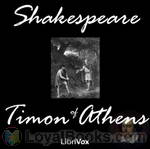 Timon of Athens
Timon of Athens
The Life of Timon of Athens is a play by William Shakespeare about the fortunes of an Athenian named Timon (and probably influenced by the philosopher of the same name, as well), generally regarded as one of his most obscure and difficult works. Originally grouped with the tragedies, it is generally considered such, but some scholars group it with the problem plays. The play has caused considerable debate among scholars. It is oddly constructed, with several lacunae (gaps) and for this reason is often described as unfinished, multi-authored, and/or experimental... | |
 Shakespearean Dialogues Collection
Shakespearean Dialogues Collection
This is a collection of scenes from Shakespeare's plays, mainly comprising dialogues between two characters. The theme for this collection is "Wooing, Wedding, and Repenting" (inspired by a line from Much Ado About Nothing). | |
 Reign of King Edward the Third
Reign of King Edward the Third
| |
 As You Like It (version 2)
As You Like It (version 2)
Shakespeare's pastoral comedy was written and first performed around 1599, and presents some of his familiar motifs: a cross-dressing heroine, a wise-cracking fool, brothers usurping their brothers' power, a journey from the court to the country, and various romantic entanglements. | |
 Tragedy of King Richard II (version 2)
Tragedy of King Richard II (version 2)
Billed by scholars as the first part of the all-encompassing Henriad, Richard II is a richly satisfying probe into the inner workings of monarchical rule and its evolution from being seen as divinely held to a more modern conception that incorporates political cunning. Shakespeare positions the titular Richard in the former position, his shortcomings as England's leader made all too clear when he bungles the handling of a judicial duel, and then later seizes money and assets that are not rightfully his in order to fund an Irish war... | |